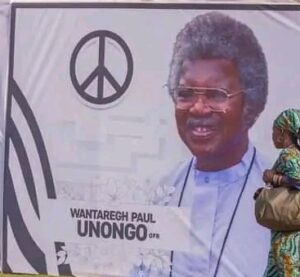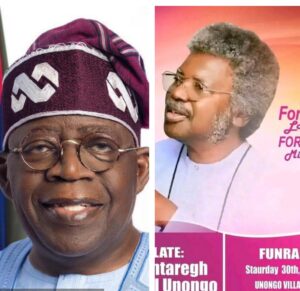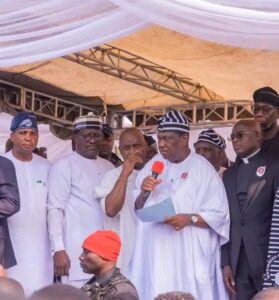The burial of the late Paul Unongo in Kwande Local Government Area, his ancestral home, took a dramatic political turn. Paul Unongo, a respected elder statesman and former Minister of Steel Development, was known for championing unity and fairness in Nigerian politics.
The ceremony was overshadowed by reports that Governor Hyacinth Alia orchestrated moves to prevent President Bola Ahmed Tinubu’s eulogy from being delivered. Angry youths, however, resisted the attempt to stop the Secretary to the Government of the Federation (SGF), Senator George Akume, from delivering Tinubu’s speech.
In his address, Governor Alia acknowledged several dignitaries, including Vice President Kashim Shettima, former President Olusegun Obasanjo, and Rotimi Amaechi. However, he conspicuously omitted any recognition of President Tinubu’s contributions to Nigeria and Benue State. This omission raised eyebrows and fueled suspicions of deliberate political maneuvering. An insider close to the governor was quoted as saying, “Alia believes he does not need the President; rather, it’s the President that needs him.”
A political analyst present observed, “Governor Alia’s refusal to recognize Tinubu was a calculated slight, underscoring his estrangement from the presidency.” The incident comes amid reports that Alia, during a recent trip to France, sought Tinubu’s intervention in Benue’s political matters but was entirely ignored. It has been rumored that Alia was not even part of the President’s delegation during the visit, attending instead for political selfish gains. This lack of attention is said to have spurred his growing rift with the presidency.
Insiders revealed that Alia’s actions at the burial were part of a broader strategy to assert his independence from Tinubu. Reports suggest that he has secretly positioned Hon. Emmanuel Jime as the Secretary of a prospective mega-political party designed to oppose Tinubu’s influence.
According to an insider, “Alia believes he does not need the Presidency for his political ambitions, rather is the President that needs him. He views Tinubu as dispensable.” This sentiment aligns with Alia’s history of political impunity, which includes sidelining party stalwarts and undermining internal democracy.
Tensions escalated at the burial when youths resisted efforts to block SGF Akume from delivering President Tinubu’s eulogy. The youths, angered by what they saw as disrespect to Tinubu and Unongo’s legacy, demanded that Akume proceed with the speech. Despite Alia’s alleged interference, Akume delivered the President’s message, emphasizing Tinubu’s commitment to national unity and Benue’s development.
One attendee noted, “Governor Alia’s actions were disrespectful not only to the President but also to the memory of Paul Unongo.”
The incident has drawn widespread criticism, with many accusing Alia of prioritizing personal ambitions over party unity and decorum. Analysts argue that his estrangement from the presidency and alleged efforts to create a rival political bloc could damage his standing within the APC.
Critics also cited Alia’s history of undermining internal democracy, his alliances with non-APC figures, and his disregard for party stalwarts. One pundit remarked, “If Alia is as popular as he claims, he should respect democratic principles or test his popularity in another party.”
Despite the political drama, Paul Unongo’s legacy as a unifier and advocate of justice remains intact. His burial was a testament to his enduring influence, even as political shenanigans attempted to overshadow his final farewell. The political landscape of Benue will likely be defined by these events as the year concludes. Governor Alia’s calculated moves may either strengthen his ambitions or hasten his political isolation.
